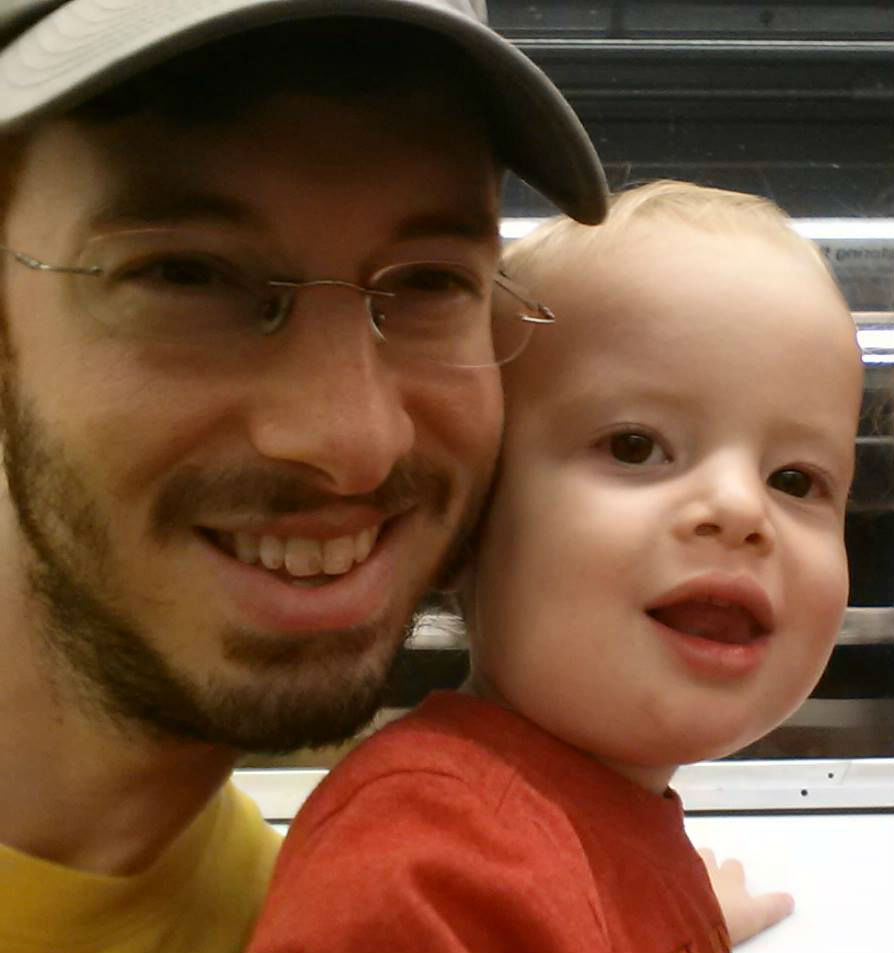My in-laws have a koi pond in their backyard. When we visited them over Sukkot, my son Barzilai—a year and three quarters old—fell in love with it. “Peepch!” he said all weekend—wonderingly, demandingly, enthusiastically—as he dragged me to the pond’s edge to peer into it; “Peepch! Mahm! [Fish! Mayim!]”
This was not the first time he’s gone ga-ga over fish. When we were in Kansas City for Rosh Hashanah, where I was privileged to join the clergy team at Beth Shalom, we had to drag him out of a fancy aquarium store next to the hotel. Something is fascinating about fish.
I flew back to Kansas City alone for Yom Kippur, but I thought of Barzilai again during Rabbi David Glickman’s afternoon class. Using Judy Klitsner’s Subversive Sequels, he led a discussion about how the story of Jonah revisits and revises the story of Noah. One person in the circle observed that both Noah and Jonah are stories we initially learn as young children. They are kid-friendly, with exciting plots that lend themselves to art projects. It’s only when we get older—if we are lucky—that we dive into the full complexity and messiness of these stories.
What stories will I tell Barzilai about my work at T’ruah, about the United States and Israel—two countries I care deeply about—and what deeper versions of these stories will I wait to tell him when he is older? Will he be crushed to learn that the “land of the free” incarcerates more people than any other nation, or that the wonderful Zionist enterprise was built at the expense of Palestinian suffering? Is there anything I can do now to lay the ground for that future re-understanding?
While I mused, Rabbi Glickman’s discussion was still dwelling on fish, and another participant asked why they were allowed to survive the Flood. This rang a bell for me—something about a Chasidic custom of eating fish on Shabbat—and following it up brought me to this Zohar passage:
The eyes of the white head [the highest/deepest emanation of divinity] are different from all other eyes. They have no eyelids or eyebrows. Why? Because it is written, “Behold, the Guardian of Israel neither sleeps nor slumbers” (Ps. 121:4)—the Upper Israel. And it is written, “Whose eyes are open” (Jer. 32:19). As our tradition teaches, whatever comes in mercy has no eyelids and no eyebrows—all the more so the white head, which needs nothing. Rabbi Shimon said to Rabbi Abba, what reminds us of this? He replied, the fish of the sea. For their eyes have neither eyelids nor eyebrows; they neither sleep nor need protection for their eyes. All the more so the Ancient of Ancients. (3:129b)
The fish who witnessed the Flood remind us of God’s ever-watchful gaze. On Rosh Hashanah and Yom Kippur, this might be a frightening image—the eye that sees all our sins and penetrates our deepest secrets—but now we are past those Days of Awe, past z’man simchateinu, the time of our rejoicing [Sukkot], and into the season where rain will soon be falling in Israel. The Zohar is describing a level of divinity that transcends judgment. The “white head” is a point of total unity, where there is only mercy and love.
My responsibility as a rabbi is to keep my eyes open, not to turn them away from unpleasant truths. Indeed, the Talmud teaches that we should walk in God’s ways by imitating God (Sotah 14a). But the Zohar offers complementary guidance: look honestly, but look with love, not with strict judgment. Look to protect.
As a welcome gift, Rabbi Glickman gave me Ruth Calderon’s A Bride for One Night, which opens with a Talmudic story she calls “The Fishpond” (Taanit 24a). In it, a kindly kindergarten teacher with a fishpond is able to bring rain where the great sage Rav is unable. In her commentary, Calderon writes,
The story of the fishpond is also a story about masculinity. A boy struggling with his letters and a parched land teach us about the limits of male power. A rabbi who proclaims a fast is up against a God who withholds rain, and the two are locked in a cycle of dryness. In this story, the Talmud presents an alternate form of masculinity…A kind hand on a child’s shoulder and the gift of a fish have the power to realign the universe in a kind of “butterfly effect”…Suddenly, it happens: Kindness overspills the bounds of justice. The storehouses of the heavens open, and the rain bursts forth. God, perhaps moved to tears, showers the land in plenitude. (2014, p. 6)
I watch Barzilai explore life, mastering new words every day, and I think about the world I want him to inherit. It is the world of the God of Jonah, as Judy Klitsner analyzes the stories—a God who grants second chances, who forgives—and not the harsh God of Noah. If I have to, I will keep working to wipe out the structures of injustice and oppression—but I would much rather find a way to melt the hearts of tyrants and turn them into friends and allies. That’s the story I want Barzilai to grow up with.
Rabbi Lev Meirowitz Nelson is Director of Education at T’ruah. He edits Torah from T’ruah and enjoys contributing from time to time. Lev, his wife Eliana, and Barzilai live in Brooklyn.

